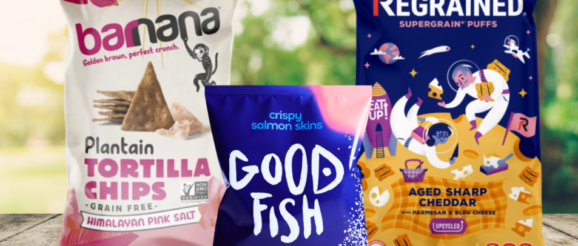Slideshow: Upcycled food and beverage innovation accelerating

KANSAS CITY – What started as a trickle is turning into a torrent as more finished food and beverage products featuring upcycled ingredients are reaching the market. What stands out about the applications is the variety of upcycled ingredients being utilized, including spent brewer’s grains, okara flour, avocado seeds, cacao fruit, salmon skins and more.
The Upcycled Food Association (UFA) estimates there are currently 400 upcycled products in the US marketplace. Interest in upcycled food and beverage products is being fueled by consumer demand for products with an environmental sustainability positioning. Products carrying a sustainability claim have continued growing during the coronavirus (COVID-19) pandemic, capturing a 17% market share during the first half of 2020, according to research from IRI and the NYU Stern Center for Sustainable Business published in July. The research builds on last year’s Sustainable Market Share Index report, which found products carrying a sustainability claim captured 16% of the market across all CPG categories last year, up from 14% in 2015.
More than half of consumers said they are buying more or as much organic products as they did prior to COVID-19, and 7 in 10 said they are buying more or as much eco-friendly products.
“This shows that sustainability-marketed products are growing, but what was really stunning is that 16% delivered 55% of market growth between 2015 and 2019,” said Tensie Whelan, founding director and professor at the NYU Stern Center for Sustainable Business.
The UFA is working to make it easier for consumers to identify products featuring upcycled ingredients with the development of a certification seal to be displayed on product packaging. The group has convened a committee of experts in sustainability, agriculture, food systems, nutrition, food purchasing and retail to create the standards. The committee is expected to complete its work in time for products on the market to carry the certification seal during the first half of 2021.
“The upcycled food certification streamlines a path for companies to mobilize action behind their sustainable development goals while educating consumers and reinforcing a new way of viewing our food system,” said Maddison Gurrola, a food technologist with Mattson, Foster City, Calif., a consultancy focused on innovation and new product development.
In early July, Tia Lupita Foods partnered with Renewal Mill, the processor of okara flour, an upcycled pulp left over from soy milk processing, to introduce upcycled tortillas. The okara flour is blended with chia seeds, avocado oil, cassava flour, lime juice, tapioca fiber and nopales (cactus) to create the tortillas.
“This generation of eaters is demanding better: better nutrition, better transparency and better accountability from the brands they buy,” said Hector Saldivar, chief executive officer of Tia Lupita Foods. “By partnering with Renewal Mill, we are able to deliver on those demands.”
Another example of upcycled innovation comes from Goodfish, Los Angeles, the maker of Goodfish crispy salmon skins. Salmon skins were previously a seafood byproduct that was discarded. Now they are being formulated into a better-for-you snack, according to the company.
